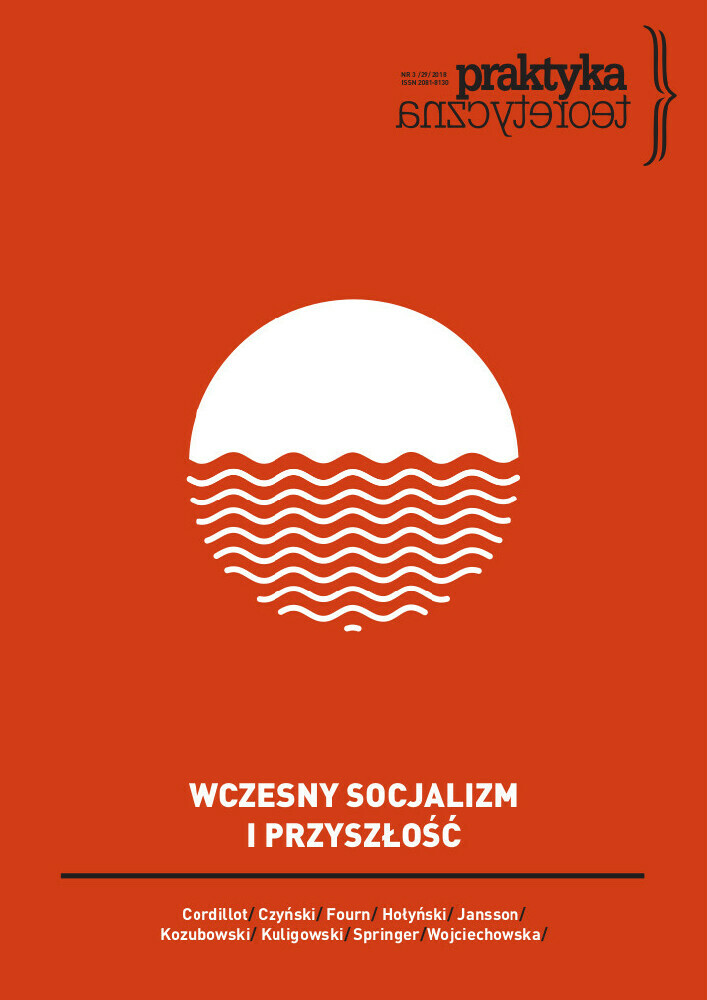Abstract
Yep, fuck it. Neoliberalism sucks. We don’t need it.
Translation: Filip Brzeźniak
References
Arendt, Hannah. 2010. Eichmann w Jerozolimie: Rzecz o banalności zła. Tłum. Adam Szostkiewicz. Kraków: SIW Znak.
Barnett, Clive. 2005. „The consolations of ‘neoliberalism’”. Geoforum 36.1: 7–12.
Birch, Kean. 2015. We Have Never Been Neoliberal: A Manifesto for a Doomed Youth. Alresford: Zero Books.
Boggs, Carl. 1977. „Marxism, prefigurative communism, and the problem of workers’ control”. Radical America 11.6: 99–122.
Crouch, Colin. 2015. Osobliwa nie-śmierć neoliberalizmu. Tłum. Łukasz Dominiak. Toruń: WN UMK.
Gibson-Graham, J.K. 1996. The End of Capitalism (as We Knew It): A Feminist Critique of Political Economy. Minneapolis: University of Minnesota Press.
Graeber, David. 2009. Direct Action: An Ethnography. Oakland: AK Press.
Hardin, Garrett. 1968. „The tragedy of the commons”. Science 162.3859: 1243–1248.
Harvey, David. 2015. „»Listen, Anarchist!« A personal response to Simon Springer’s »Why a radical geography must be anarchist«”. http://davidharvey.org/2015/06/listen-anarchist-by-david-harvey/
Healy, Kieran. 2016. „Fuck Nuance: Sociological Theory”. https://kieranhealy.org/files/papers/fuck-nuance.pdf
Heckert, Jamie. 2010. „Listening, caring, becoming: anarchism as an ethics of direct relationships”. W Benjamin Franks (ed.). Anarchism and Moral Philosophy. New York: Palgrave Macmillan: 186–207.
Ince, Anthony. 2012. „In the shell of the old: Anarchist geographies of territorialisation”. Antipode 44.5: 1645–1666.
Jeppesen Sandra., Anna Kruzynski, Rachel Sarrasin i Émilie Breton. 2014. „The anarchist commons”. Ephemera 14.4: 879–900.
Le Billon, Philippe. 2012. Wars of Plunder: Conflicts, Profits and the Politics of Resources. New York: Columbia University Press.
Lewis, Nick. 2009. „Progressive spaces of neoliberalism?”. Asia Pacific Viewpoint 50.2: 113–119.
Maeckelbergh, Marianne. 2011. „Doing is believing: Prefiguration as strategic practice in the alterglobalization movement”. Social Movement Studies 10.1: 1–20.
Ong, Aihwa. 2007. „Neoliberalism as a mobile technology”. Transactions of the Institute of British Geographers 32.1: 3–8.
Peck, Jamie. 2004. „Geography and public policy: constructions of neoliberalism”. Progress in Human Geography 28.3: 392–405.
Peck, Jamie. 2010. „Zombie neoliberalism and the ambidextrous state”. Theoretical Criminology 14.1: 104–110.
Purcell, Mark. 2016. „Our new arms”. W Simon Springer, Kean Birch. i Julie MacLeavy (eds.). The Handbook of Neoliberalism. New York: Routledge: 613–622.
Rollo, Toby. 2016. „Democracy, agency and radical children’s geographies”. W Richard J. White, Simon Springer i Marcelo Lopes de Souza (eds.). The Practice of Freedom: Anarchism, Geography and the Spirit of Revolt. Lanham, MD: Rowman & Littlefield.
Shannon, Deric. i J. Rouge. 2009. „Odmawiając czekania: Anarchizm i teoria przecięć”. http://www.anarkismo.net/article/15049.
Springer, Simon. 2008. „The nonillusory effects of neoliberalisation: Linking geographies of poverty, inequality, and violence”. Geoforum 39.4: 1520– 1525.
Springer, Simon. 2009. „Renewed authoritarianism in Southeast Asia: Undermining democracy through neoliberal reform”. Asia Pacific Viewpoint 50.3: 271– 276.
Springer, Simon. 2010. „Neoliberalism and geography: Expansions, variegations, formations”. Geography Compass 4.8: 1025–1038.
Springer, Simon. 2011. „Articulated neoliberalism: the specificity of patronage, kleptocracy, and violence in Cambodia’s neoliberalization”. Environment and Planning A 43.11: 2554–2570.
Springer, Simon. 2012. „Anarchism! What geography still ought to be”. Antipode 44.5: 1605–1624.
Springer, Simon. 2013. „Neoliberalism”. W Klaus Dodds, Merje Kuus i Joanne Sharp (eds). The Ashgate Research Companion to Critical Geopolitics. Burlington, VT: Ashgate: 147–164.
Springer, Simon. 2014. „War and pieces”. Space and Polity 18.1: 85–96.
Springer, Simon. 2015. Violent Neoliberalism: Development, Discourse and Dispossession in Cambodia. New York: Palgrave MacMillan.
Springer, Simon. 2016a. The Anarchist Roots of Geography: Toward Spatial Emancipation. Minneapolis, MN: University of Minnesota Press.
Springer, Simon. 2016b. The Discourse of Neoliberalism: An Anatomy of a Powerful Idea. Lanham, MD: Rowman & Littlefield.
Springer, Simon, Kean Birch i Julie MacLeavy. 2016. „An introduction to neoliberalism”. W Simon Springer, Kean Birch i Julie MacLeavy (eds.). The Handbook of Neoliberalism. New York: Routledge: 1–14.
White, Richard. J. i Colin C. Williams. 2012. „The pervasive nature of heterodox economic spaces at a time of neoliberal crisis: Towards a »postneoliberal« anarchist future”. Antipode 44.5: 1625–1644.
Wilson, Japhy. 2016. „Neoliberal gothic”. W Simon Springer, Kean Birch i Julie MacLeavy (eds.). The Handbook of Neoliberalism. New York: Routledge: 592–602.
Zimbardo, Philip. 2017. Efekt Lucyfera: Dlaczego dobrzy ludzie czynią zło? Tłum. Anna Cybulko, Joanna Kowalczewska, Józef Radzicki i Marcin Zieliński. Warszawa: WN PWN.
License
“Theoretical Practice” seeks to put into practice the idea of open access to knowledge and broadening the domain of the commons. It serves the development of science, thinking and critical reflection. The journal is published in open-access mode under the CC-BY-NC-SA 4.0 license (detail available here: http://creativecommons.org/licenses/by-nc-sa/4.0/). Articles published in the journal may be freely distributed, stored, printed and utilized for academic and teaching purposes without restrictions.
They should not be, however, used for any commercial purposes or be reconstructed into derivative creations. Access to the journal may not be limited or offered for a fee by any third party.
Prospective authors are obliged to fill in, sign and send back the publishing contract compliant with the CC licencing. [PL.pdf, PL.doc, EN.pdf,EN.doc].
According to this contract, authors grant the journal a non-exclusive right to publish their work under the creative commons license (CC-BY-NC-SA 4.0) without any financial obligation on both sides of the contract.
Before submission authors should make sure that derivative materials they use are not protected by copyright preventing their non-commercial publication. Authors are responsible for any respective copyright violations.
